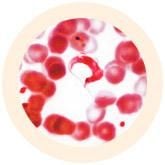Chagas (Trypanosoma cruzi)
Out of Stock
Product Details
Additional Information
| Sizes | Giantmicrobes are based on actual microbes, cells, organisms and other critters, only 1,000,000 times actual size! Gigantic (GG) 40-60cm XL (XL) 25-38cm Original (PD) 12-20cm Minis (MM) 5-10cm each Keychain (KC) 5-10cm with clip |
|---|---|
| Materials | Plush from all new materials. Stuffed with polyester fiber fill. Surface washable: sponge with water & soap, air dry. |
| Packaging | Each plush microbe includes a printed card with fun, educational and fascinating facts about the actual microbe or cell. |
| Safety | Every product meets or exceeds U.S. and European standards for safety. For ages 3 and up. |
All about Chagas (Trypanosoma cruzi)
FACTS: In 1909, Brazilian scientist Carlos Chagas described a new disease – Chagas disease. He also identified its cause: a newly discovered Trypanosoma protozoan, which he named “trypanosoma cruzi” to recognize fellow Brazilian physician Oswaldo Cruz’s heroic efforts to fight yellow fever, bubonic plague, and smallpox. Chagas also identified the primary source of transmission of the disease: triatomine bugs (sometimes called “kissing bugs” because of their tendency to bite sleeping victims on the face at night). Chagas mistakenly believed it was the bite of the bug that transmitted the disease, when in fact it was later discovered that transmission occurred when the bugs’ parasite-carrying feces were rubbed into the bite wound – or the eyes. But small matter: the variety of Chagas’ personal contributions to the understanding of a particular disease are a singular achievement in the history of medicine.
The signature mark of a new Chagas infection is a swollen eye (Romaña's sign) near the site of the initial infection. Aches, pains, and generally flu-like symptoms are also not uncommon after initial infection. But in many cases, no symptoms are observed, so many people are unaware that they are infected with Chagas disease. Still, while the initial infection normally resolves quickly, Chagas disease can linger for decades, and can ultimately cause heart disease, intestinal and neurological problems – and even death.
Though Chagas disease is endemic to Mexico and Central and South America, global travel now accounts for a growing number of cases worldwide. If you’re not feeling yourself and you remember getting “kissed” on the face at night, check it out. Chagas did.
| Name | Named after the scientist who first identified it. |
|---|
| Actual Size | 15 to 20 micrometers |
|---|
| Where It Lives | Chagas disease is caused by a parasite called Trypanosoma cruzi, a common parasite in Central and South America. The parasite spreads through bed bugs and reduviid bugs, also known as the “kissing bug”. Kissing bugs live in walls made from mud and thatch, and come out at night to feed on the blood around human lips and eyes. T. cruzi can remain undetected in humans for decades! |
|---|
| Symptoms | Fever, tiredness, muscle aches, diarrhea, vomiting; swelling around bite areas known as chagomas; swelling and enlargement of lymph nodes, spleen, and liver; and heart failure if left untreated. |
|---|
| Cure | There’s no vaccine available and anti-parasitic drugs are only effective in the early stages of disease. |
|---|
| History |
It was first identified by Brazilian hygienist and bacteriologist, Carlos Chagas, in 1908. Big Outbreaks: The CDC estimates that 8 million people in Central and South America have Chagas disease and most of them don’t even know it! Recent Outbreaks: 2015: Over half of the states in the U.S.A. reported cases of Chagas disease. |
|---|
| Fascinating Facts |
Scientists suspect T. cruzi evolved 100 million years ago. That’s more than 30 million years before T-Rex! The oldest recorded case was found in a 1,150 year old mummy in South Texas. Famous people associated with it: 1835: Charles Darwin recorded being bitten in the night by a kissing bug during his travel in South America. |
|---|






